
THE SMOKE's 50 FAVORITE FILMS OF THE 1990's
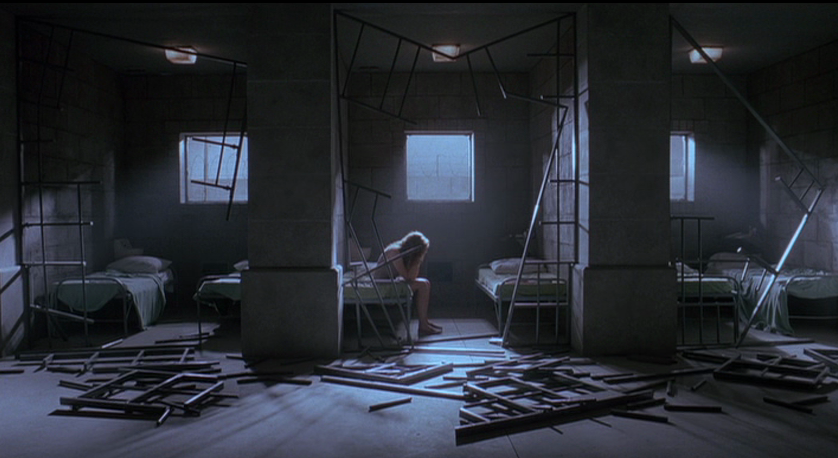
Yep - lists. The internet's overflowing with them. "8 Best Pie Flavors from Central America"...you get the idea. But a discussion of notable films from the 90's came up years ago among future 'smoke writers (back in what is now being referred to as "the myspace days"), and we wanted to bring that discussion back. All five participants - John Cribbs, Christopher Funderburg, Ian Loffill, Marcus Pinn and Stu Steimer - were asked to come up with their 75 favorite movies from that long-ago decade: the results were then calculated into one master list of 50. Each film will be written about over the next five weeks as we draw out this self-indulgent entry into the endless abyss of movie lists, classed up thanks to contributions from some of our favorite film writers.
<<<CLICK HERE FOR #'s 41 - 50>>>
40. THE THIN RED LINE (1998, Terrence Malick)
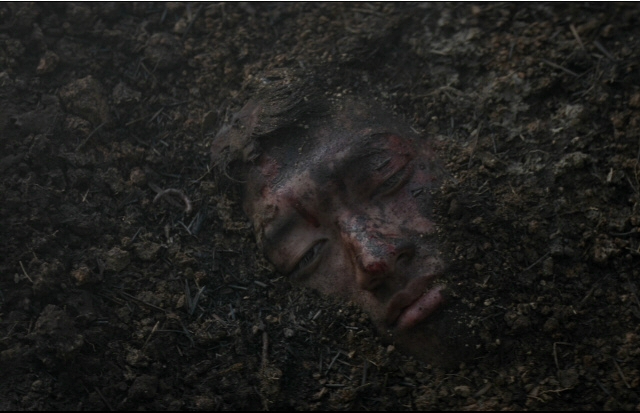
marcus pinn
I'm really digging the connections between all the movies I've written about so far. Not only did The Thin Red Line inspire the overall vibe and atmosphere of Ratcatcher, it also heavily inspired one of my all time favorite movies: George Washington (which I mentioned quite a bit in my Ratcatcher write-up.) This film holds a lot of weight as I'm sure it's the only war movie on this list, which is just fine with me because in my opinion it should be the defining war epic of the 90's.
By the 80's just about everything had been squeezed out of the Vietnam war on the big screen with films like Apocalypse Now, Casualties Of War, Rambo and Platoon. And just when you thought there was nothing else that could possibly be done, Kubrick managed to squeeze out a little bit more with Full Metal Jacket, then Oliver Stone made Born On the Fourth Of July a few years later. Sure the 90's brought us Vietnam-related side stories like Dead Presidents and The Walking Dead, but for the most part making a Vietnam War movie by the mid 90's was kind of like beating a dead horse. We get it - cue the helicopter and gunshot sounds, play that one song by Jimi Hendrix or The Doors, show scenes of sweaty solders with the peace sign on their helmets and we got ourselves a Vietnam movie. It was time to move on. For some reason World War One wasn't something modern directors wanted to really tackle (and to this day still don't unless you count Flyboys) so it was on to World War II with movies like Saving Private Ryan, Tigerland, The Tuskegee Airmen, etc. But just like the Vietnam war on the big screen, World War II movies were starting to get a little formulaic. It was time for an unlikely candidate outside of the Spielberg-type director to tackle World War II. Who better to do such a thing than Terrence Malick, who not only hadn't directed anything in 20 years but up until The Thin Red Line had only made two smaller-scale films. To go from Badlands and Days Of Heaven to returning from a 20-year hiatus to make a 3+ hour long war epic is pretty damn ambitious and unexpected.
Much of Thin Red Line's hype was on the return of the Bobby Fisher-like weirdo Terrence Malick who likes to be in hiding, doesn't like having his picture taken or giving interviews. That kind of hype is dangerous because it causes people to get too caught in the return of a director and not question if the actual movie they returned to make is even good or not. Much like Kubrick's return with Eyes Wide Shut, people were so caught up in the name of Kubrick to realize he left us with a pretty questionable movie (although nice to look at). But in my opinion Malick delivered one of the greatest war movies to date with The Thin Red Line.
The only thing I hate about writing about a Malick film is that it almost forces you to write like you're one of his characters saying random dreamy voice-over shit. For people who haven't seen The Thin Red Line, I'd describe it best by calling it "arthouse meets war epic" or "beauty and nature meets explosions and gun fire" (see what I mean? I could barely write that with a straight face.) Seriously though, Terrence Malick brought a whole new approach to the war genre and gave it a breath of fresh air that still inspires war movies today (notice the increase of war films in the arthouse/indie scene?) The most noticeable aspect about The Thin Red Line is Terrence Malick's newfound extra dreamier style. Unlike Badlands and Days Of Heaven, the voice-over in Red Line is a lot more poetic, existential and non-linear than it is narrative and the look is cleaner and glossier. It's as if Terrence Malick had gone back to film school and took with him some of the playful and borderline pretentious qualities that many film school students have and mixed it with his mature film making style from the 70's. The other major drawing power that the The Thin Red Line has is its A-list ensemble cast of actors (Sean Penn, Nick Nolte, John Travolta, Woody Harrelson and George Clooney.) But what's interesting is that even in a sea of big names like that, up & comers like Ben Chaplin, Adrienne Brody and Jim Caviezel got a chance to shine (actually those three actors were more like the stars of the film while Nolte, Penn and Clooney where the supporting actors.) The cast was so stacked that you forget other actors like John C Reilly, Elias Koteas, Jared Leto and even John Savage are in it (along with Mikey Rourke, Martin Sheen and Viggo Mortensen, who had their scenes cut from the movie.)
For the fact that Malick wasn't afraid to not only take his time but be ambitious, playful and a little bit experimental with a genre that was slowly becoming predictable and played out, The Thin Red Line deserves to be mentioned alongside the other great movies of the 90's. How often do you come across a great war film that's poetic, dreamy and existential?
39. THE RAPTURE (1991, Michael Tolkin)
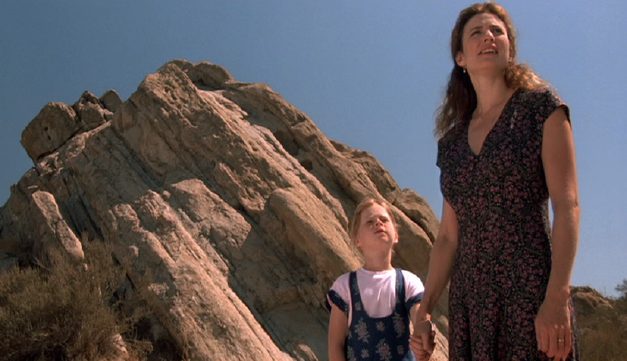
stu steimer
In 1833 William Miller, a Baptist preacher based out of New York, made the public claim that through intense study of Biblical scriptures – a process which ate up more than fifteen years of his life - he was able to ascertain a rough approximation of when Jesus Christ would mark his return to Earth: sometime between 1843 and 1844 (this period would come to be altered slightly, eventually targeting a specific date - October 22, 1844 - as being the final judgment), a point of warning Miller would make clear after his laborious scrutiny of Daniel 8:14:
"Unto two thousand and three hundred days; then shall the sanctuary be cleansed."
Miller's interpretation of this verse was in relationship to the re-building of Jerusalem in 457 B.C., and a "day" in this case was representative of a year. Hence, 2300 years later - 1844. His proclamation was scoffed at initially, but by 1840 a curious thing started to occur as the day of Miller's judgment drew closer: his following grew. Dramatically. Millerites stopped being just a regionalized, isolated sect of zealot nutters and became a national front of zealot nutters with followers ranging in the thousands and branches teaching Miller's message all throughout the country. By 1844 the few of the chosen, who remained true and pure to the faith, were already beginning to relish in the joys of entering into the realm of God, an eternity of salvation waiting for them as their souls be sent adrift into the heavens, the Earth below them disintegrating under torrents of molten rain. In truth being amongst the later party is probably the more desirable option, as I would be spared of hearing the boasting and self-satisfying for all eternity.
When the sun rose on October 22, followers congregated together to wait for their savior's return; most had relinquished all their belongings, and spent whatever savings they had accumulated in their life. They wouldn't need it. And so they waited. And then dawn broke on October 23, the day that would later be known as "The Great Disappointment" for reasons that should be quite obvious.
Even though much of Miller's church would disband the following year and Miller himself would be the focus of ridicule for the rest of his life, he never gave up his own faith, believing that Christ would return and the end would fall in his lifetime. Five years later his world would end; he died with 67 years worth of life experience behind him, only to be immortalized for his delusions and naivety.
And yet Miller was not unique. He wasn't the first to wax poetic about a judgment day that was to occur in the near future, and he certainly would not be the last. Just last year, scores of followers of Harold Camping's Family Radio left their jobs, depleted their savings and exhausted their energies into promoting a day of biblical rapture (May 21st 2011) and universal destruction (October 21st of the same year) that would never pan out. It is laughable and I do not shed a single tear or have any sympathies for this level of stupidity that has gone to prove Darwin's theory of natural selection flawed, but at the same time it is something that I have found – and will continue to find - completely fascinating about human nature. Michael Tolkin's film, now 20 years old, could have been produced last year: its relevance only seems to be increasing.
Sharon's story begins like so many other 700 Club testimonials: an information operator, bored with her mundane existence seeks out anonymous sex in order to fill the gaping void in her life, but experiences a complete shift once she is accosted by two pamphlet-spreading witnesses who show up at her door one morning to preach the warning that we are living in the last days. Noting that it won't be long before Christ's return, Sharon seeks out to do witnessing of her own, and starts to relay the same message to anyone who experiences the misfortune of coming into contact with her. There is no date to anticipate when the great schism is to occur, but it is going to happen, soon.
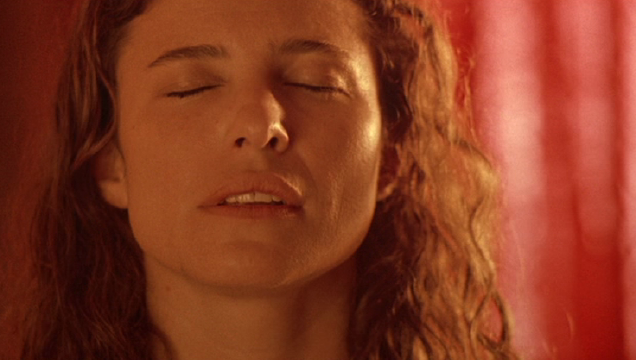
Seven years later Sharon marries former swinger-mate David Duchovny, trading in the mullet he sports in the beginning of the film for a Bible and business suit, where they reside with their seven-year-old daughter in upper-middle class suburban Los Angeles. After Duchovny is killed by a workplace shooter, Sharon decides that the time is at hand. She packs up a few belongings, takes her child and drives out to the desert to wait for Christ's return, which should be occurring in just a few days.
And so they wait, and they continue to wait. Frustrated at the failure of a savior to appear, Sharon begins to question why he has refused to return, and what it is she is doing incorrectly. Missing her father, Sharon's daughter pleads for her to kill her and send her to heaven; there is no use living in this world any longer. Sharon tries to wait it out, silently pleading for God's intervention, before doing the job that Abraham could not finish.
Sharon's love for God is at once self-serving yet brutally devoted. Just like the Millerites and followers of Harold Camping, she so dearly wants the rapture to happen, soon; to be whisked away to Heaven, becoming one of the few lucky ones who are able to thump their chest for overcoming the sins of the Earth and salivating over their final reward, the ultimate in tacit superiority. But God's love, eternal as it allegedly may be, is loaded with conditions and stipulations that no human will ever be able to possibly lie in abeyance with and still maintain a sense of free-will and personal morality. Sharon comes to realize this towards the climax of the film, when the fundamentalist view of the rapture and biblical apocalypse occurs as literally as it would in any Left Behind movie, but the final result of the devoted is much different. God, as it turns out in this world, exists. The problem is that He is kind of a prick. In order to see heaven, Sharon must maintain a zombie-like composure and state of mind by laying down her eternal life for an entity that can only ask for more and more from His flock, a concept that does not seem to make much sense for the creator of all and everything to even care about. To have any shred of autonomy and self-worth means to be cast into a featureless purgatory of empty terrain. Heaven or the void. She chooses the void.
In one way or another every generation believes it is the last – and global events and catastrophes always get blamed for being harbingers of a final doom, this despite the fact that in the geologic scale all those natural catastrophes have remained fairly pretty static. But who can blame them? To steal a bit from Patton Oswalt, how great would it be to die in the apocalypse? You'll be the only generation in 180,000 years of humanity to have those kind of bragging rights. Eventually someone's going to be validated, either when the sun goes supernova consuming the inner planets, or when Nibiru crashes into the Earth, or when Pestilence, Famine, War and Death ride into town. When that day comes I don't want to be around, because the self-congratulatory bullshit that will flood the Earth as a result is the last thing I ever want to see or hear, and it would really be miserable if it were.
38. DEVIL IN A BLUE DRESS (1995, Carl Franklin)
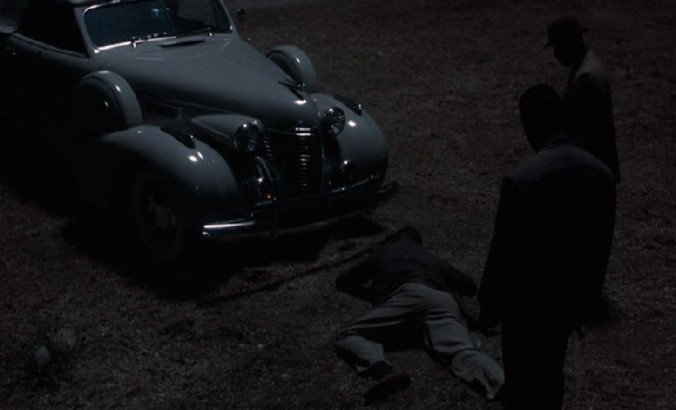
christopher funderburg
Although technically part the late 80's/early 90's New Black Cinema boom, Carl Franklin's work never fit comfortably in a mold set by films like Straight out of Brooklyn, Boyz N the Hood, New Jack City or even Deep Cover. The wildly eclectic and original Spike Lee fit more agreeably in the movement (likely because he more or less defined it with Do the Right Thing) than the hard-to-categorize and anti-prolific Franklin. For instance, Franklin's stunning breakthrough film, One False Move, worked from a script written by Billy Bob Thornton (and Tom Eperson) and featured as many white main characters as black. To this day, it's rare for even the most lauded of black directors to be given projects that aren't "black" in terms of content and focus.* In the early 90's, many black directors explicitly felt the need to make films about the black experience and get the cinematically under-represented minority on screen not just as supplements to some white guy's story but starring in their own. The sly thing about Franklin and what seperates him from his contemporaries is that while he was equally (if not more) engaged with the same concerns, he chose to address them via a sympathetic portrayal of a racist, naive Arkansas redneck sheriff. He's never been unfraid to portray his black characters as unredeemable, near-demonic villains, nor is he willing to let sympathetic characters off the hook for their amorality. Which brings us to Devil in a Blue Dress, a hard-boiled noir that deep down really wants to examine the nature of human relationships and to what extent we should forgive flawed people because they're our friends or we're in love with them. Pointedly, Franklin contrasts the relationship between Denzel Washington's out of work WWII veteran Easy Rawlins and Don Cheadle's charming, hot-headed Texas low-life Mouse against Jennifer Beals' titular femme fatale and the failed mayoral candidate whom she was set to marry. In true noir fashion, Devil is populated by sympathetic anti-heroes, characters neither truly despicable nor righteous, good people forced by fates beyond their control to shame themselves. But isn't that a running theme of New Black Cinema - decent people driven to awfulness by a society with rigid rules in which they had no say?
I've re-linked him to his contemporaries, but the fact that Franklin embraced the conventions of the concurrent neo-noir boom instead of the New Black Cinema confirms my initial point. A lot of older African Americans were wary of the direction black culture appeared to be headed - Franklin had a decade or two on the young men (and Casi Lemmons) who led the charge in the movement and he's been fairly outspoken about his quesiness with music and film's not-so-subtle glorification of violence and self-destruction. A film like say Juice or Menace II Society purports to critique the rot and desperation of the ghetto, but ends up making a life of crime look awesome and turns its most vicious characters into stars. Heck, Tupac made a career pretending to be more like his violent loose cannon in Juice than he actually was in real life. Franklin's decision to take on a project set in post-war Los Angeles stems from his ambivalence about the burgeoning "gangsta" culture: he addresses contemporary issues obliquely, moving his film to a time both more unjust and more hopeful, a moment in time when Rawlins needs to fear for his life just driving a white woman through a nice neighborhood at night, but also when the hard won opportunity to own property in middle-class South Central L.A. signaled a future of independence if not freedom. Franklin's themes are enriched by a tension between color-lines still so strong not even the richest man in L.A. dares cross them, but when ghettoized neighborhoods were not yet hopelessly overrun with poverty, violence and despair. Rawlins' era feels like a moment of intractable black/white apartheid, but when future black degradation and humiliation lacked inevitability. Looking back through an expanse of time has a dulling effect, it allows audiences to ingest Devil's ideas and consider its themes without Franklin's notions seeming accusatory or self-righteous. By eschewing the realities of life in early 90's Los Angeles, Franklin can avoid critical dismissals for his lack of appropriate militancy, sell-out paternalism or "these old guys - parents just don't understand" (because any of these criticisms would naturally be levelled by someone very into hip-hop.) Using Post-War L.A. as a mirror of the current landscape allows him to address the political issues of the slightly askance. Without having to take sides in the modern debate and offering solutions, Devil frees itself up to critique and contemplate as a de-politicized artistic activity. While certainly not an apolitical movie, Franklin's choices avoids an actionable message and, as a result, Franklin isn't forced to stand in as "the voice of his people," the bane of all minority filmmakers. It gains a specificity and artistic freedom to be about these characters, this world, this story.
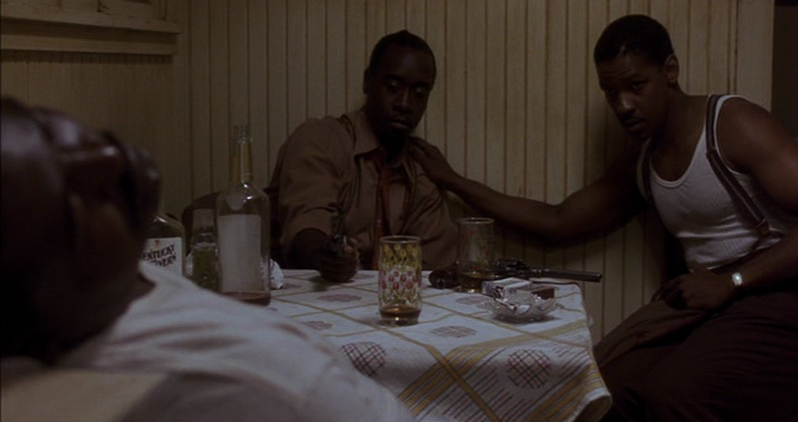
But let's not get too pointy-headed about it: first and foremost this movie rules up and down the block - a twisty, sexy, dark, badass thriller, passages of it recall but never direclty reference the exemplars of the noir genre: Detour, Chinatown, Double Indemnity. Fate assaults Rawlins from all directions, but he refuses to be crushed, won't go down without a fight even if blackjack-wielding policemen, a pedophilic politician, a knife-wielding gangster, a sleazy private bodyguard and an ax-burnishing tree-murderer are all closing in around him. Rawlins has too much pride to let people piss on him and tell me it's raining, too much resiliency and independence to be a pawn. During a violent interrogation, a cop can take a crack at him exactly once. He won't be getting in a second shot. The film is filled with classic scenes that balance violence and humor, confrontations driven by witty dialog that abruptly turn tense, moments of unexpectedly shocking brutality - moments of intensity that cause you to erupt in laughter. Much of the film's striking tone can be attributed to Don Cheadle's career-making performance as the quick-to-the-trigger Mouse, Rawlins' best friend and the ace up his sleeve when he decides to stop playing it safe and start fighting. Cheadle's performance blows the film open like a shotgun blast, knocking the slow-burning narrative off its axels and spinning off wildly in unpredictable directions. Funny, driven by base impulses, charming, intimidating, amoral, Mouse fires off some of the best lines and reactions in the film, including the moment when he exasperatedly/apologetically tells Rawlins "If you didn't want him to get killed, Easy, you shouldn't have left him alone with me" or his swooning, happily panicked reponse to finding out they could get $7,000 for some stolen photographs. Franklin, a former actor himself, orchestrates a cast that is excellent down to a man, including career-best performances from Tom Sizemore (perfectly cast as a sadistic sleazebag) and Jennifer Beals as the mysterious, desperate woman Rawlins is hired to hunt down. Hell, there's a good argument that both Denzel Washington and Cheadle did their absolute best work in Devil. I'd be very receptive to that argument.
A lion's share of the credit, of course, needs to go to novelist Walter Moseley, who wrote the Easy Rawlins series and consulted on the screenplay for Devil. Much of the dialogue has an easy wit about it, a more naturalistic take on the kind of clever banter commonly associated with classic film noir. The twisty plot drives forward with a gripping clarity but total unpredictability - you understand the stakes of the mystery and the thread of the plot at all moments, but still can't possibly guess where the film's focus will shift next. Franklin seems to have a deep connection to the material and teases out the nuances of Moseley's script; the overall mood, performances, feel of the film enrich the already excellent source. Tak Fujimoto's typically moody yet understated cinematography gets a big assist from the world-class production design by Gary Frutkoff (it should have won the Oscar) and Elmer Bernstein's smoky, jazz-tinged score subtley underlining it all. The film truly works that Hollywood magic of bringing together the absolute best in the business at their respective jobs - Washington, Cheadle, Moseley, Fujimoto, Bernstein, Frutkoff, even producer Jonathan Demme (who will appear more frequently on this Top 50 list as producer than a director) are all professionals of the highest order and they all bring their A+ game. Franklin never ascended to the level of reknown as his colleagues on Devil - aside from this film and One False Move, he never made another film even worth watching - but I still think he deserves all the respect in the universe for getting it right with Devil. He breathes vibrant, intense life into one of the greatest characters who will appear on this Top 50 list: Easy Rawlins. Rawlins embodies the conflict in all of us - but especially in any oppressed population - to strike back at the indignities visited upon us when we know our gestures of rebellion could very well could be futile and, if anything, we'd be better off just keeping our mouths shut. You can't help but cheer as Rawlins reveals himself smart enough, tough enough, self-controlled enough to annihilate the scumbags who regularly jam their guns in his face, rescue the girl from torture, smash some marble counter-tops and pay his mortgage. But Franklin is too good to let it lay. The cops still smirk menacingly at him from their patrol beat. That weirdo keeps trying to chop down neighborhood shubbery. Unleashing Mouse means innocent people will get shot or killed. Rawlins ends the film out of work, hanging out in his front yard, wondering about the future. Except for a little cash in his pocket, he's back exactly where he started. What was the cost to get there?
* Steve McQueen is the giant asterisk here. He gets to make movies about hot, shirtless white guys. As an accomplished visual artist operating outside of the commercial system, he's in a great position to define himself and has taken full advantage of it. In terms of Hollywood types, I suppose John Singleton got to direct easily the worst film in the venerable Fast and Furious franchise, but I'm not sure how far a Tyrese-starring, souped-up underground street-racer film put him outside the realm of "black" film. Just for comparison, Franklin used his creative capital coming off of Devil to direct a Meryl Streep cancer melodrama. Lee Daniels' fairly whitebred follow-up to Precious is coming out soon and apparently it features Nicole Kidman pissing on Zac Efron, so I guess that's something. I hear Macy Gray is good in it, but I sorta don't believe she could ever top her work in Spiderman. Spike Lee made 25th Hour and Inside Man, but come on - he's Spike Lee and sui generis. It's just rare is all I'm saying, not that it is unheard of. Pretty much if a black filmmaker makes a movie that isn't explicitly about black people, Hollywood executives force it to be about music, hip-hop/b-boy culture, street art, souped up vehicles or dancing. Also, I guess here is where I could mention that Franklin gives a nice nod to Oscar Micheaux in Devil by having one of his films playing at a movie theater.
37. Pulp Fiction (1994, Quentin Tarantino)
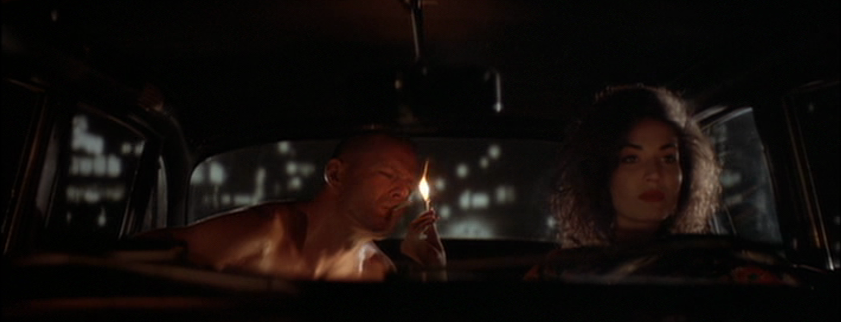
marcus pinn
I get the feeling that I need to defend this instead of simply do a write-up on it. I'm glad that I was given Pulp Fiction to write about, as it kind of ties in with my previous 90's write-up on 71 Fragments and the ridiculous amount of ensemble/interwoven plot movies that came out in the 90's mostly due to Pulp Fiction.
Ok look...I realize that Pulp Fiction's overall influence on cinema has ultimately been a negative one but we aren't talking about Smoking Aces or 2 Days in the Valley or Get Shorty (which ironically features two cast members from Pulp Fiction) or just about anything Guy Richie and Robert Rodriguez are responsible for. Try your best to block out all those bad Mad TV/SNL Pulp Fiction skits and parodies that bombarded us for almost two years. Pretend you didn't overhear all those delusional video store clerks talking about how they were going to make a movie and didn't need film school because Tarantino did it without film school. Block out all the idiots who called Tarantino original or acted like he was the first director to make a movie with the plot out of order. Close your eyes and forget about how much Quentin Tarantino's annoying big-chinned face was shoved down our throats for the duration of the 90's and just focus on the movie itself, along with the few positive aspects and influences it had on cinema. Pulp Fiction is a great movie. The only problem is that everyone likes it and film snobs usually don't want to have anything in common with the average moviegoer so they have to be defiant. Trust me...to this day I cringe when I hear people say "I'm gonna get mid-evil on your ass" or "royale with cheese." But Quentin Tarantino didn't run those lines into the ground. People did. These days the minute you say you like Pulp Fiction, you get grouped in with a bunch of myspace teenagers, frat boys and Roger Ebert/Leonard Maltin know-it-all film critics. It's the same thing with Clockwork Orange. Over the years that movie gets less and less of a co-sign from film enthusiasts because it has that stigma of having stupid people love it strictly because it's (ultra)violent. I've just all together stopped telling people it's one of my favorite movies. I find it funny that I'm defending a director who I haven't been a fan of for quite some time - Kill Bill Part 2 completely fell apart at the end, Death Proof was just a bunch of annoying chicks babbling about nonsense and Inglorious Basterds was a cheap excuse to be unnecessarily violent and hide behind Judaism. I also find my defense of Tarantino interesting because in a few short months I'm probably going to want him dead after the release of his pulp slavery western Django Unchained. I can just imagine him in an interview right now saying some shit like, "You know...when you think about it, slaves were kinda badass and I'm just trying to show that side of them. You know?"
But back to Pulp Fiction because none of what I'm saying is helping...
To this day many people don't get Tarantino's style. Imagine for a moment if movie directors were musicians. If Steven Soderbergh was a guitar player or Joel Coen was a drummer and Jim Jarmusch was a saxophonist, Quentin Tarantino would be one of the greatest DJ's to ever touch turntables (but not an actual musician.) I make that comparison because Tarantino does with film what good DJ's do with music. They mix, re-mix, combine and splice together different elements from pre-existing songs (or movies in Tarantino's case), put their own unique touch on it and present it to the world (I'm a DJ and a movie nerd so I know what I'm talking about.) If I ever had an inkling that Tarantino thought he was making a completely original piece of work (which is what so many people try to credit Pulp Fiction as) this movie would be nowhere near my list (like I'm sure it's nowhere near John or Chris lists.) The best I can do is say that Tarantino's approach to making this was pretty original. He made the ultimate movie mixtape. He took characters, music, scenes, lines of dialogue and direct plots from other films and combined just about every different movie genre into one big pot. Tarantino's references to other films were to obvious for him to take credit for them. It's not his fault that people don't watch enough movies and think Pulp Fiction invented cinema. Get mad at those idiots, not Tarantino.
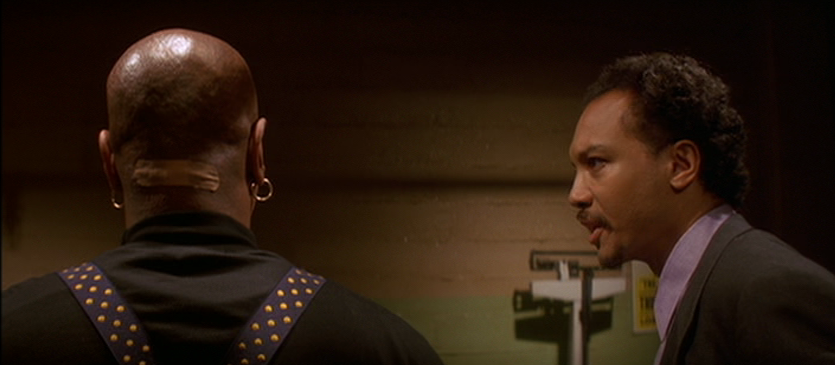
Pulp Fiction is the one exception in that bullshit group of movies that supposedly have to be on a best of the 90's list like Shawshank Redemption, Forrest Gump, The Matrix, American Beauty, etc. And it's not that I put this movie on my list to avoid scrutiny from people. But if we're doing a movie list on the 90's, you have to include Pulp Fiction because it did kind of played a major part of that decade. Not to sound super corny, but it managed to touch just about every demographic - from the MTV generation to (most) film buffs and movie snobs who got Pulp Fiction's movie references. It became a household film unlike other typical household films up to that point. In one film, Quentin Tarantino managed to expose everyone to the cinema of Alex Cox, Jean-Luc Godard, Martin Scorsese and more in one giant movie collage. He essentially took us into the mind of a movie buff. So when I include Pulp Fiction on my list, I'm not bringing all the baggage and stigma that comes with it. I think that's the problem some people have with it today. They can't disassociate all the extra shit that Pulp Fiction spawned and just look at the movie. I'm sure there are plenty of people who could debate against that statement until they turn blue but I honestly couldn't imagine the 90's without Pulp Fiction. You can't say that about too many movies from the 90's and that's why it's on this list.
36. Chameleon Street (1990, Wendell B. Harris Jr.)
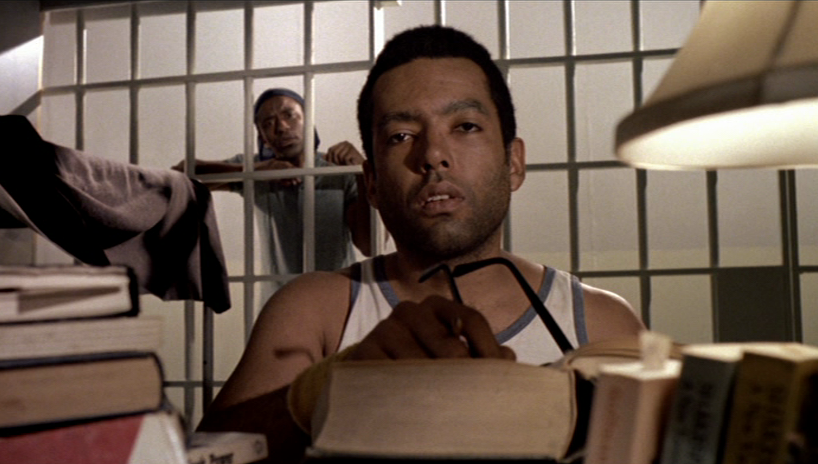
john cribbs
If you think Carl Franklin is hard to place in the ranks of black cinema of the late 80's/early 90's, I submit to you the case of one Wendell B. Harris, Jr. The name raises a giant question mark over the heads of many a film enthusiast, some who simply don't recognize it and others who wonder why it didn't end up as prominent within the independent community as contemporary Steven Soderbergh. For starters, Harris only made one film. Debuting at Sundance in 1990 along with two completely different kinds of movies from black directors - Charles Burnett's To Sleep with Anger and Reginald Hudlin's House Party - Harris' Grand Jury Prize winner Chameleon Street was something inbetween. Like Hudlin's film - the template for every black ensemble comedy of the last 22 years from BAPS to Booty Call* - it celebrates irreverence and the freedom of irresponsibility (and boasts a giddy "use their own rules against them" mentality similiar to the great Putney Swope.) As funny as anything in Hudlin's movie, Harris' debut is at the same time sullen, reflective, angry, heavy with the history and experience of black America. It demonstrates a masterful awareness of space and location in terms of aimless go-nowhereness - the living room of a house or expanse of downtown Flint are as confining as a prison cell - that recalls the enclosures of Burnett's South Central LA. Harris, playing the lead character, surrounds himself with geographical reminders of his limitations, but maintains the passionate restlessness of a picaresque hero, setting out into the world in search of trouble. Defiantly, he breaks down the obstacles set up to hinder a man of little means towards great success; in other words, he's not going to let Robin Harris tell him he can't go to the party. Everyone else may rely on money or connections or, god forbid, hard work, but Harris' William Douglas Street, Jr. merely shows up claiming to be a big shot and his natural talent for performance and mimicry convince other people that it's so. He's as much a con artist as Danny Glover's Harry Mention from Burnett's movie, except he's going in the opposite direction: rather than root himself in the worst vices of minority culture (drinking, gambling, family abandonment) Street is bettering himself beyond his social stature, albeit through swindle and graft.
Harris creates one of modern movies' most alluringly engimatic characters in Street. Based on a real life con man from Harris' home state of Michigan (with segments also inspired by the exploits of confidence trickster Erik Dupin), Street is a malcontent criminal in the mold of Frederick J. Frenger, Jr.,** eager to skip to the happy ending where instead of being a dead end loser working for his father's burglar alarm company he's an up-and-coming doctor, or a charismatic human rights lawyer, or a fascinating French foreign exchange student at an Ivy League academy. The fact that he never went to med school, studied law or speaks French are mere trivialities, since Street doesn't so much learn the trade as read the people and provide them with an illusion they can accept. The fact that he's shockingly successful in the fields he fradulently inserts himself into, even performing a hysterectomy after a quick glance at Gray's Anatomy while masquerading as a skilled surgeon (like Frenger, who accidentally solves cases Hoke Moseley's been working for months), is both a humorous twist and a suggestion that people aren't necessarily bound by their disadvantages. But that's the great flipside of Doug Street: on the one hand, he's a paragon of liberation from the perimeters set by society and its empathsis on professional conduct rather than actual skill; on the other, he's a walking caveat against getting too far away from oneself. At the same time Street is craftily, almost magically, exceeding the expectations most people would afford an uneducated black man, the more he integrates himself into the roles that are as dull and conventional as Street is singular and audacious. The initial motivation is money, but with each new identity the incentive to become someone else comes from the urge to escape a perpetual boredom bordering on psychopathy. He grows more confident behind the mask, both literal (a surgical mask in the operating room, an elaborate costume of Cocteau's Beast - a self-pitying, self-exiled, yet majestic and powerful antihero Street sympathizes with - at a party) and figurative, as his false identities turn into excuses to ignore the real life as husband and father and, in a role that doesn't suit him any better, criminal. Street's refusal to sit tight and do what he can with what the world gives him makes him a lovable cad, but the disguises become less empowering and more a retreat from responsibility the longer the compulsion to con leads him to a new adventure.
It's hard not to see Harris Jr. and Street Jr. as one and the same, not just because of the name similarity, but the confidence, the pride of purloined privilege and invented identity through sheer will of his vigorous personality, which is ironic considering it's the very thing he wants to escape. Street is at once self-hating, desperate to get away from who he really is, adapting to cultures - celebrities, college students, rich whites - as far from his own as possible, and fiercely proud of his skillful deceptions, that he's able to play these elitist cliques and pass himself off as a popular member. You get the same feeling that Harris, as actor and director, is slipping on his own borrowed personality and having a merry old time leading the audience through the film as Street is at trying on one identity after another. Like Street, he's a Michigan native who came out of nowhere to become an instant expert, creating what feels like an effortlessly brilliant and exciting film that seems to be daring you not to love it even as it pleads for acceptance (but in a weird way that's totally engaging.) Harris, his voice a strong Barry White-Mo Fuzz basso profundo, naturally exudes authority and self-assurance while balancing on the daintiest of platforms (and I don't just mean because he often comes off as such a dandy.) With Chameleon Street, he celebrates black integrity while also trying to tear himself away from the weight of it, offering a look at the most brazen of extortionists, womanizers and egotists who surpasses the enclaves of class and race with irrefutable satisfaction, examining racial identity as though he didn't have a personal stake in it. Yet at the same time being aware of what he's doing! It's nearly indescribable, as if the title of the movie were a double meaning and "Chameleon Street" could just as well be a location, a mental one, where a person can seamlessly transition from one walk of life to another, bolstering their own individuality while simultaneously losing themselves among the mainstream. Sounds like the business of filmmaking to me, and indeed Harris structures the film to compliment its thematic agenda, moving from one vignette to the next, stitching together a narrative tracked by Street's increasing unease with his own identity and compulsion to scam and swindle that's just part of his makeup.***
But Harris finds unity within the character's isolation, since the one thing that does bring us all together is a love of cinema and Harris/Street, like Spike Lee, has a great appreciation of classic movies, particularly French ones (the La belle et la bęte references, named himself "Pepe le Mofo.") It's just too bad Harris couldn't make more of his own because this, to me, is as exciting a debut as people consider Citizen Kane (and similarly underrecognized in its time.) Welles' Kane thought it would be fun to run a newspaper, just as Street thought it would be fun to be a surgeon/lawyer etc., just as Harris clearly thought it would be fun to make a movie. Apparently it all went to his head, since after the film's feat at Sundance Harris scandalized the audience with his acceptance speech, which John Pierson refers to as the "most remarkable Sundance incident of egomania run amok." The movie wasn't picked up, eventually being given a small release by Northern Arts and debuting at Film Forum. Warner Brothers bought the remake rights, but (thankfully) nothing ever came of it besides a scene from The Pursuit of Happyness that borrows Street's impressing a white businessman with his dexterity with a Rubik's Cube. Harris' follow-up films Negropolis and Arbiter Roswell never happened, and instead of becoming one of the most important black directors of the 90's his legacy is as the decade's greatest one hit wonder: he hasn't made another film to date, appearing as an actor in only two (a notable small role in Out of Sight, a more forgettable one in Road Trip.)
* Debate amongst yourselves whether it was preceeded by Disorderlies.
** They're all "juniors" aren't they, trying to break away from their namesake?
*** Interesting to note that Chameleon Street ends with the fable of the scorpion and the frog, just as Neil Jordan's The Crying Game would two years later and that, instead of ending with "It's in my nature," the excuse for Harris' self-damning scorpion is "It's just my character."
CLICK HERE TO CONTINUE WITH #'s 31-35
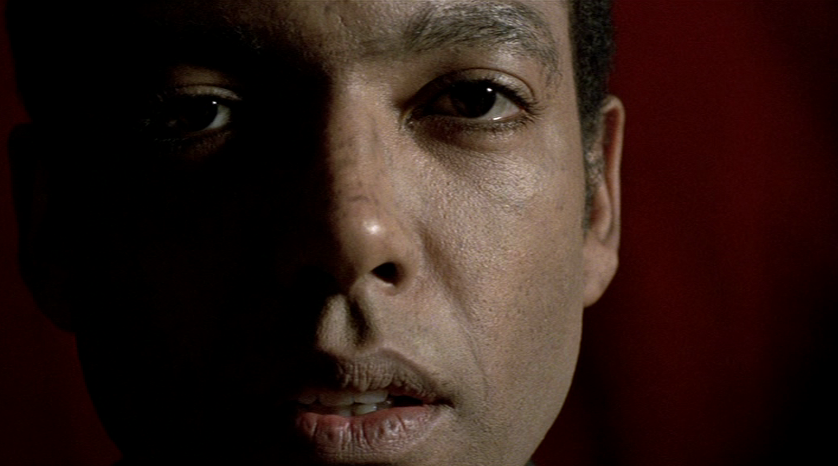
RELATED ARTICLES
home about contact us featured writings years in review film productions
All rights reserved The Pink Smoke © 2012